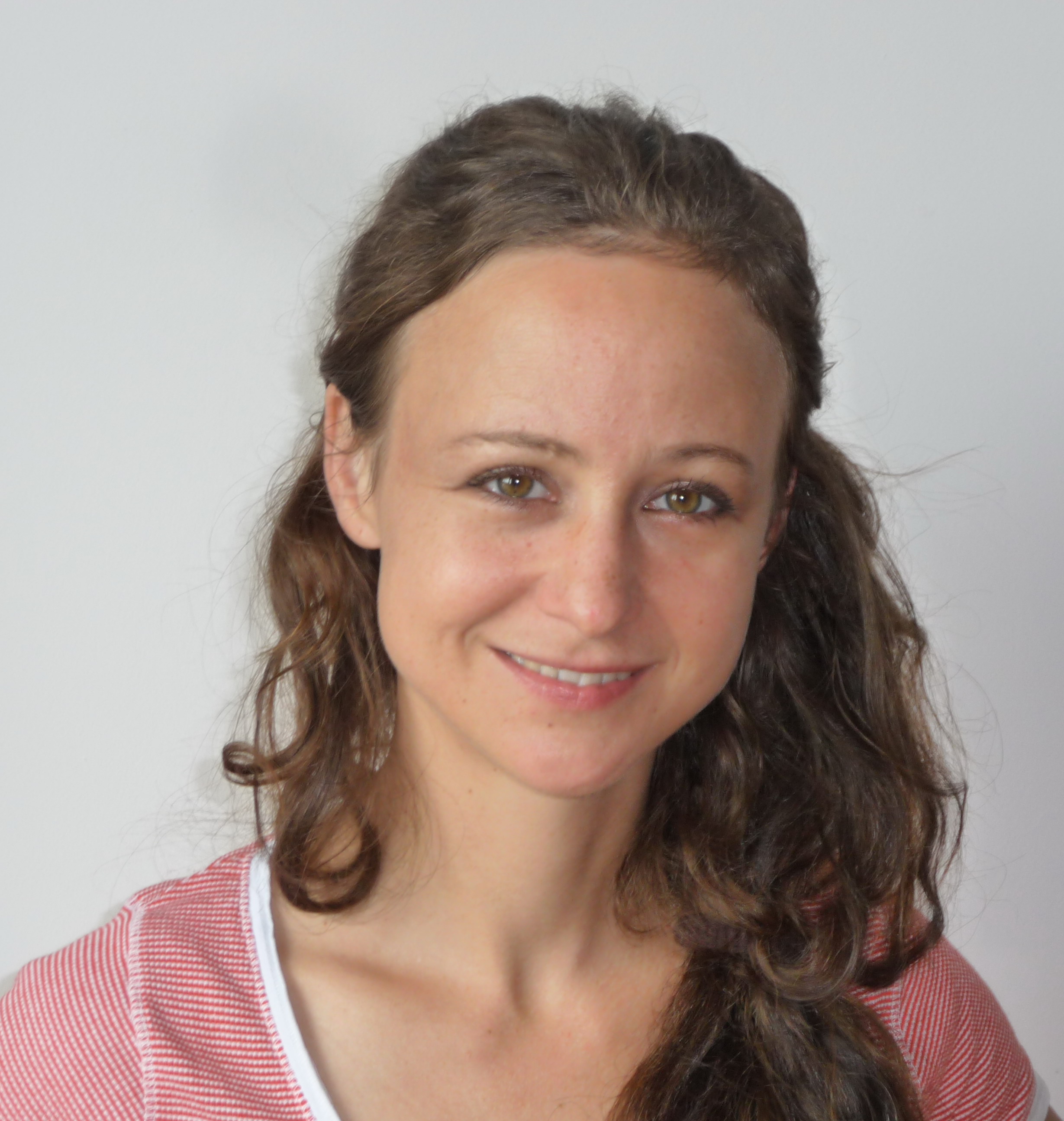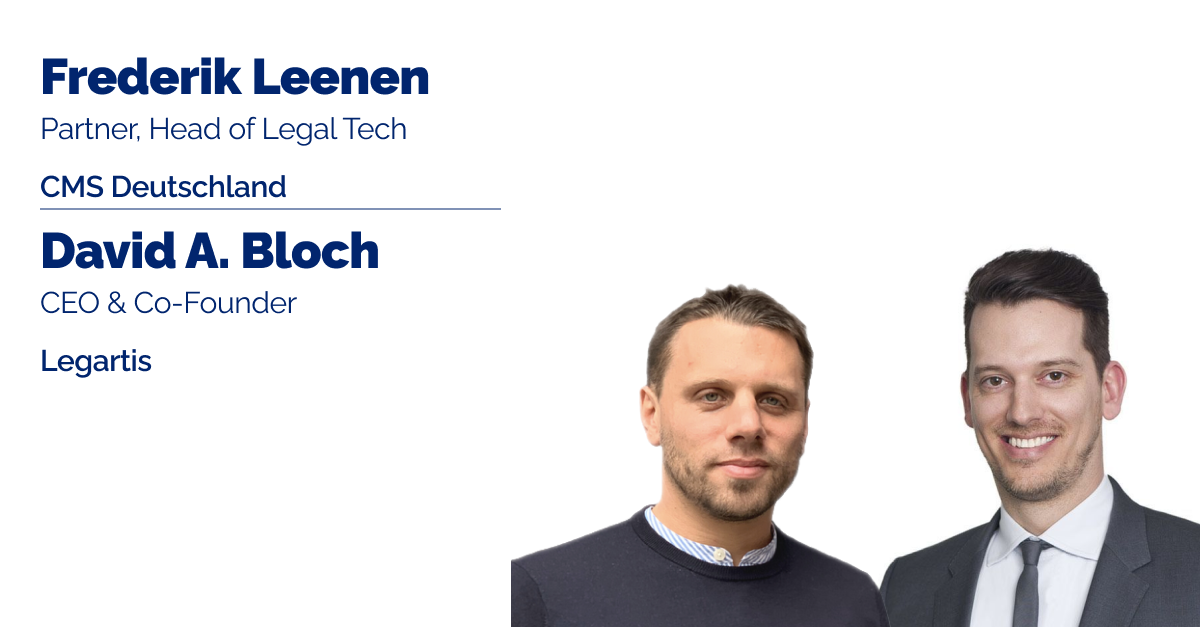The international law firm CMS Germany entered into a technology partnership with Legartis at the beginning of 2020 as part of the development of a comprehensive data protection compliance application. Since the end of 2021, CMS has been on the market with its self-developed product ComplyDPA. The application enables company-internal departments to independently carry out AVV processes. The technology partnership of the two companies pursued the goal of integrating Legartis' competencies in the area of AI-supported contract analysis into ComplyDPA. To this end, Legartis developed an interface from AI to the CMS product that enabled AI-assisted analysis of order processing agreements (AVV). Frederik Leenen, Head of Legal Tech at CMS Germany, and David A. Bloch, CEO at Legartis, provide information on the background to this collaboration.
How did CMS Germany approach Legartis as a technology partner in the area of AI-powered contract analytics? What role did Legartis play in this partnership??
FL, CMS: Legartis was a younger start-up at the time we were looking for a technology partner. But it was already well-known and impressively successful, one that was on people's radar. At that time, we were specifically looking for suitable legal tech partners who could work with us to advance customer-centric legal technologies.
After talking to Legartis, it quickly became clear that their skills, experience and customer structures complemented each other well..
After a few meetings, we became confident on a personal and substantive level that Legartis had both the expertise and the agility to create the greatest possible customer value in the area of contract analysis when it came to developing an overall technological solution for contract creation, analysis and review. In particular, Legartis' outstanding AI capabilities tipped the scales in favor of entering into a technology partnership with Legartis. The rough division of roles was that Legartis would develop the contract analysis for the product and CMS would build the rest of the application. But then, of course, we helped each other in many areas, exchanged ideas and worked together.
What is the idea behind CMS ComplyDPA and how does the application work?
FL, CMS: When companies "outsource" processes or use cloud offerings, it is regularly necessary to conclude a DPA (German AVV) or SCC with the provider. Errors that are to be considered violations of data protection law can result not only in fines and reputational risks but also in claims for damages by those affected. Creating DPAs or SCCs for each individual case or checking such contract texts provided by the other side for legality costs time and ties up resources. CMS ComplyDPA is a web-based data protection application that enables the creation and analysis of DPAs and SCCs to be fully mapped in a single system - with flexible adaptation to corporate requirements.
So, in a nutshell, we see the following benefits for our clients and customers, across industries and company sizes:
- Relief of the legal and data protection departments
- Enabling the specialist departments to carry out DPA and SCC processes independently
- Compliance-compliant, transparent and DSGVO-compliant documentation
- Flexible adaptation to company requirements
- The standard version of ComplyDPA is available in German or English, other languages can be integrated if required.
- All functionalities in one application
In addition to legal advice, we would like to support and relieve our clients with this digital solution.
What appealed to Legartis about contributing their knowledge to CMS ComplyDPA product development?
DB, Legartis: For us, the idea of contributing our contract analysis expertise to a comprehensive legal tech product from CMS Germany was exciting.
The fact that we convinced as a technology partner showed us that we are on the right track with our AI - especially with the approach of a pre-trained AI that is able to deliver repeatable and consistent results in contract analysis right from the start.
The joint meetings and discussions with CMS were characterized by productivity and innovative spirit. This inspired us to enter into this partnership. Of course, we were pleased that our competencies in contract analysis convinced CMS.
How do you describe the collaboration? What challenges did you face and how did you solve them together?
FL, CMS: The cooperation was always extremely professional, on an equal footing, and also based on a mutual understanding of the differences between a legal tech unit of a large law firm and an ambitious start-up. The latter was certainly also the special challenge - a start-up is naturally enormously agile and a "speedboat" and even if the legal tech unit of CMS can act more agile than one would traditionally expect from a law firm, Legartis had to be patient on many occasions and CMS, conversely, had to speed up its processes. Nevertheless, we have always noticed that, despite different framework conditions, we "tick" in a very similar way and can simply work well together - and that is exactly what has also helped us a great deal in overcoming all the challenges.
DB, Legartis: For us, the months of development together were both challenging and exciting. They gave us the opportunity to better understand the processes and the customer and client needs of a large law firm. It was clear to us that as a young start-up, we could push product development at a higher speed. Since we were able to coordinate our next steps with CMS at any time, we ultimately succeeded in synchronizing the development phases well.
What are the most important lessons learned from the project - what do you take away from it??
FL, CMS: There are many. For example, not everything is transferable to the other world. But it was exciting and enormously instructive to learn in such close proximity how a market player like Legartis operates. One of the things that became clear again and again during the collaboration was how important open communication is. Precisely because there are many differences, it is important not to make too many assumptions, but to always ask open questions in order to understand the other person.
DB, Legartis: We were inspired in the area of DPA auditing by the cooperation with CMS. The in-depth discussion, or rather the AI training on DPAs, has led to Legartis today also delivering impressive audit results in this type of contract. When two different companies start product development with each other, open communication as well as an understanding of the other's situation is the cornerstone for success. This communication strength on both sides has certainly contributed to the successful conclusion of the technology merger.
How do you rate the importance of artificial intelligence applications in the legal field?
FL, CMS: Machine learning can make work much easier and is indispensable in many areas of our office. However, many potentials have not yet been fully exploited because the technology is not yet available in the way it will certainly be in the future. I therefore believe that machine learning will be enormously important, especially when it comes to quick assessments of large amounts of data. At the same time, it is also the case that it remains the case that the lawyer is difficult to replace by technology in the field for which he has studied for a very long time. In a way, however, that is also encouraging for all of us.
DB, Legartis: The artificial intelligence revolution has only just begun. The potential is huge. Personally, I am looking forward to new, exciting use cases that will make the work of lawyers easier. Although much is already possible today, there is fascinating potential for further development in relation to contracts: In the future, will we perhaps be supported in contract negotiation by an AI that compiles knowledge from diverse sources and thus offers humans legal as well as tactical support? The legal department of the future will no longer need to read through lengthy documents from top to bottom. It can concentrate on value-creating activities, closely accompany business development and benefit from the optimal combination of machines and humans.
What are the next goals of CMS Germany and Legartis in the legal tech sector?
FL, CMS: Of course, we have new projects in the pipeline, but as always, we will only talk about them in due course. But there are also more general goals that we are pursuing, including the continuous broadening of our offering for our clients, but also the continuous expansion of the use of such tools in the firm, i.e. the development of more and more use cases. We are currently pleased to have been nominated as one of the finalists of the PMN Management Awards 2022 in the category "Legal Tech" - there was a very strong field of applicants this year, against which ComplyDPA successfully prevailed.
DB, Legartis: Legartis is already setting new standards in automated contract review. We want to continue on this path: Legartis, as an AI company, will continue to drive the development and thus the possibilities of artificial intelligence in the future. Similarly, we continue to develop our products so that they continue to be easily and joyfully used by professionals in and outside legal departments for contract analysis. We see that legal departments are increasingly recognizing the great potential of a solution like Legartis. This development alone drives us at Legartis to further develop our products every day.
About Frederik Leenen, Partner, Head of Legal Tech CMS Deutschland: Frederik Leenen ioined CMS Germany in 2010. In 2007, he obtained a Master of Laws (LL.M.) specializing in intellectual property rights from the University of Connecticut School of Law. In 2014, he followed this with a technically oriented legal doctorate on the topic of "Copyright and Computer-Aided Detection." He is co-head of the "Smart Solutions - Legal Tech and Know-How" division, which combines legal tech, smart operations (alternative sourcing) and knowledge management. There he leads the Legal Tech sub-division technically, operationally and sales-wise. 2022 Frederik Leenen was appointed Partner.
About David Alain Bloch, CEO & Co-Founder Legartis: David Alain Bloch is both a lawyer and an entrepreneur at heart. He is a Co-founder and Board member of the think tank foraus - Swiss Forum on Foreign Policy. In addition, he has also been a Global Shaper of the World Economic Forum since 2014, co-founded the corresponding Hub in Bern and presided over the Zurich Hub in 2016/2017.
Recommended Articles
Swiss Prime Site: AI to Analyze Over 1’000 Contractual Relationships
The Jelmoli department store on Zurich's Bahnhofstrasse is being closed. For the operating real estate company, Swiss Prime Site (SPS), the closure represents an enormous..
Legartis and Implenia Enter AI Partnership for Contract Reviews
Zurich, 2 April, 2024 – Legartis, the pioneering DACH-region company in the field of Artificial Intelligence (AI) for contract reviews, today announced its collaboration with..



